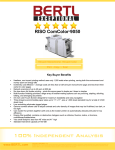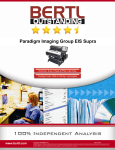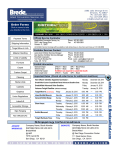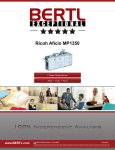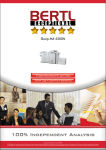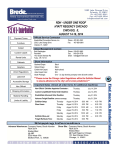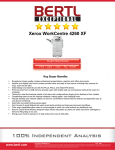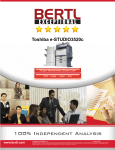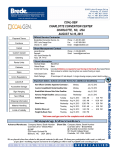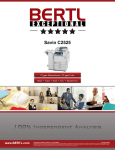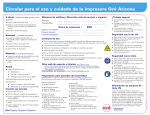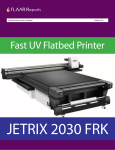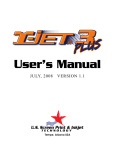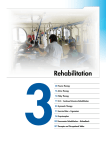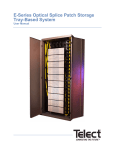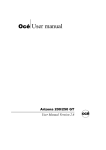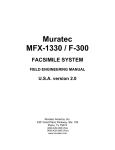Download Océ Arizona 350 GT Printer - Océ | Printing for Professionals
Transcript
Océ Arizona 350 GT Printer Wide Format • Printer 49.2 x 98.4 x 1.89 inch Flatbed, 239ft2/hr, 5 color www.bertl.com Copyright © 2009 BERTL, Inc. March 8, 2009 All Rights Reserved. The license under which this document is made available and applicable law prohibit any reproduction or further transmission of any portion of this document. This document may only be viewed electronically through the www.BERTL.com Web site and may not be stored in electronic or hard copy format. Any reproduction of trademarks is strictly prohibited. BERTL accepts no responsibility for any inaccuracies or omissions contained in this document. WideFormat March 8, 2009 Océ Arizona 350 GT Printer www.bertl.com Table of Contents Introduction 5 Introduction Océ History The Océ Arizona 350 GT Printer Printing With White Ink The Océ Family of Wide-Format Printer Systems 5 5 6 8 9 The Océ Arizona 350 GT Printer ONYX ProductionHouse Océ Edition RIP Application Océ Arizona 350 GT Printer Console Application 10 12 Image Quality 17 Performance File-to-Print Performance 22 22 Print 10 15 Image Quality 17 Performance 22 Media Handling: Media Input 24 Media Capacity Size Loading and Unloading Media Rolls 24 24 24 25 Media Handling: Output Finish 27 Output Finish 27 Routine Maintenance 28 Routine Maintenance Copyright © 2008 BERTL, Inc. 28 March 8, 2009 All Rights Reserved. The license under which this document is made available and applicable law prohibit any reproduction or further transmission of any portion of this document. This document may only be viewed electronically through the www.BERTL.com Web site and may not be stored in electronic or hard copy format. Any reproduction of trademarks is strictly prohibited. BERTL accepts no responsibility for any inaccuracies or omissions contained in this document. Page 2 WideFormat March 8, 2009 Océ Arizona 350 GT Printer www.bertl.com Table of Contents (cont.) Accessibility 31 Accessibility User Accessibility to Device Controls User Accessibility for Printed Media User Accessibility of Media Refilling User Accessibility of Media Jam Removal User Accessibility of Routine Maintenance 31 31 31 31 31 Summary 32 31 Summary 32 About BERTL 34 About BERTL Copyright © 2008 BERTL, Inc. 34 March 8, 2009 All Rights Reserved. The license under which this document is made available and applicable law prohibit any reproduction or further transmission of any portion of this document. This document may only be viewed electronically through the www.BERTL.com Web site and may not be stored in electronic or hard copy format. Any reproduction of trademarks is strictly prohibited. BERTL accepts no responsibility for any inaccuracies or omissions contained in this document. Page 3 WideFormat March 8, 2009 Océ Arizona 350 GT Printer www.bertl.com BERTL Galaxy© Star Rating Océ Arizona 350 GT Printer Bui ld Qua lity Ne tw ork Ad mini stratio n Wo rkflow Ea se of Use Me di a Ha nd lin g P rintin g Ima ge Qua lity P erform ance Fe ature s Price 0.0 1.0 2.0 3.0 4.0 5.0 ABOUT BERTL’S GALAXY© STAR RATING BERTL understands how difficult it is to choose one office-imaging device over another and strives to make this an easier choice for the consumer. That said, how does a consumer decide between two or more devices that carry the same BERTL 3-, 4-, or 5star rating? Category Criteria: Build Quality: An analysis of the construction quality of the major components that the user must interact with on a regular basis (e.g., paper tray, access covers, suppliers, etc.). Network Administration: The quality of administrative and management utilities (both executable and Web based) when compared to that of a sliding scale benchmark based on the network administrative feature set of other vendors. Workflow: The quality of the network scanning, job submission, document management, sharpening, and enhancement of the conversion and job layout tools based on a sliding scale benchmark when compared to the workflow tools employed by other vendors. Ease of Use: Ease of maintenance (adding paper, toner, misfeeds, cleaning) and ease of using the documentation, help, control panel, print drivers, and client utilities analysis when compared to a sliding scale benchmark on the ease of use of other devices. Media Handling: Throughput specifications and evaluations based on a sliding scale benchmark when compared with the handling of special media (e.g., oversize, thick, or coated stock) found on other devices. Printing: Duplex and simplex print productivity based on tests and printing feature set analysis when compared to a sliding scale benchmark based on the feature set found on other devices. Image Quality: The quality of business color images (text, dot, line, halftone, and solid quality) based on tests and a subjective rating on the quality of continuous tones (photos) when compared to a sliding scale benchmark based on the continuous tone quality of other devices. Performance: Performance and productivity based on tests and printing feature set analysis when compared to a sliding scale benchmark based on the feature set found on other devices. Features: The feature set compared to a sliding scale benchmark based on the feature set found on other devices. Price: MSRP of a system configured with network printing, copying, scanning, and media trays/rolls (wide format) configuration. Copyright © 2008 BERTL, Inc. March 8, 2009 All Rights Reserved. The license under which this document is made available and applicable law prohibit any reproduction or further transmission of any portion of this document. This document may only be viewed electronically through the www.BERTL.com Web site and may not be stored in electronic or hard copy format. Any reproduction of trademarks is strictly prohibited. BERTL accepts no responsibility for any inaccuracies or omissions contained in this document. Page 4 WideFormat March 8, 2009 Océ Arizona 350 GT Printer www.bertl.com Introduction Print Device Features Summary List Price Starting at $141,900 Test version: $156,900 BERTL Inc. recently tested the new Océ Arizona® 350 GT flatbed printer. It is based on an Océ-developed platform that combines a true flatbed design and a separate, dedicated optional roll-to-roll capability. The Océ Arizona 350 GT printer can print on rigid media up to 98 inches wide x 49 inches long x 1.89 inches thick. The large format flatbed printer uses four-color (CMYK) UV curable inks and Océ VariaDot imaging technology with near-photographic image resolution to deliver true production print speeds (sellable prints) of 239 ft2/hr. Printing Method Piezoelectric inkjet using UV curable inks and Océ VariaDot imaging technology The Océ Arizona 350 GT printer comes in a variety of configurations. The optional roll-to-roll module can print onto flexible media as wide as 87 inches. The Océ Arizona 350 GT printer also offers a new white ink option that can help expand your revenue-producing opportunities. The entry price for the Océ Arizona 350 GT printer is $141,900 in the U.S. 239 ft2 per hour (Flatbed) Maximum 188 ft2 per hour (Roll Media Print Speed Option) OCÉ HISTORY Océ history goes back to 1857 in Venlo, The Netherlands, when the company began in the pharmaceutical industry as a family owned and operated company. In 1919, the company entered the copier market by starting the production of blueprint material. In 1931, a new technology called the semidry process was marketed under the name of Océ; the Océ name is an abbreviation of “Ohne Componente,” which means “without components.” In the 1960s, the demand for office copier systems grew rapidly, and Océ focused its attention on plain paper copying, for which there was a large demand in offices. In 1973, the first plain paper copier equipment was introduced: the Océ 1700. In 1983, Océ introduced its first equipment for copying large-format originals on plain paper, the Océ 7500. In 1995, Océ introduced its first digital high-volume printer/copier for office environments and for technical documentation in wide format. Since the 1990s, Océ has also marketed a line of wide-format monochrome scanners followed by wide-format color scanners ranging from 36- to 54-inches wide scanning capability. CMYK (Cyan, Magenta, Ink System Yellow & Black) White Ink option (CMYK+W) Maximum Print Resolution Due to the Variable Dot technology the resolution is comparable to a 1440dpi printer although the addressable resolution is lower Color Modes Color printing plus optional white 2 per color (CMYK), 8 Total Print Heads With White Ink Option: 2 per color (CMYK+W), 10 Total Droplets size 6 to 42 picoliters Cutter None Print Workflow ® TM Print Driver ONYX ProductionHouse software Océ Edition, v7.2 or greater Interface Copyright © 2008 BERTL, Inc. 100/1000 Mbits/s Ethernet March 8, 2009 All Rights Reserved. The license under which this document is made available and applicable law prohibit any reproduction or further transmission of any portion of this document. This document may only be viewed electronically through the www.BERTL.com Web site and may not be stored in electronic or hard copy format. Any reproduction of trademarks is strictly prohibited. BERTL accepts no responsibility for any inaccuracies or omissions contained in this document. Page 5 WideFormat March 8, 2009 Océ Arizona 350 GT Printer www.bertl.com THE OCÉ ARIZONA 350 GT PRINTER The Océ Arizona 350 GT is a four color (CMYK) printer with an option for white ink. The UV flatbed inkjet printer is capable of producing large-format images on various rigid and flexible media. The printer consists of a large vacuum table and moving gantry. The material is held flat and stationary on the vacuum table during printing. The gantry contains a carriage that sweeps across the table as the gantry moves in steps along the length of the table to print an image on the media. In addition to the benefits of stationary positioning, the use of UV ink technology on rigid material eliminates finishing processes such as mounting and lamination. To ensure that the media is staying flat, the printer has a heavy vacuum pump preventing any media slipping during print. Since not all prints need to reach the maximum width of 98.4”, the printer’s flatbed is divided into three different zones to ensure better suction for smaller media sizes. The vacuum zones are usercontrollable. The printer and the Controller station are connected to the local LAN through an Ethernet connection in the back, which supports 100 Mbit and 1 Gbit fast Ethernet. The Océ Arizona 350 GT printer comes pre-configured with either a four-color ink system or a factory-installed five- color ink system that includes the white ink option. Printers can be upgraded with the white ink option in the field. The physical print resolution depends on the print mode. The printer comes with the option of ONYX ProductionHouse RIP v7.2 for $4,995 to facilitate printing from any locally connected computer. The Océ Arizona 350 GT printer is a 98.4” x 49.2” flatbed printer. The Océ Arizona 350 GT printer uses UV curable inks and Océ VariaDot™ imaging technology to deliver near-photographic image quality on a wide range of rigid and flexible media. The promise of Océ VariaDot technology on a four color ink printer is that it uses less ink than a comparable six color inkbased system. The maximum production speed is 239 ft2/hr for rigid media and 188 ft2/hr for roll feed media. Print speed also varies based on print mode and the use of white ink as indicated in the table below. Print Mode Production: Quality: Quality-Matte: Quality-Density: Fine Art: White Ink - Quality 3 Layer: White ink - Quality 2 Layer: Print Speed 239 ft2/hr 164 ft2/hr 117 ft2/hr 91 ft2/hr 133 ft2/hr 55 ft2/hr 82 ft2/hr The Océ Arizona 350 GT flatbed printer has a footprint of 8.7 ft x 6.5 ft for the table. Including the gantry the width grows to 13.4 ft, requiring a fairly large room for operation. To make it possible to get this in your production room, the printer can be tilted 90º to move it into your facility with the aid of the Tilt-N-Go rigging accessory, thereby preventing the need to break down walls to get it in there. Lastly the Océ Arizona 350 GT printer uses a single phase voltage of 208V and a rated current of 16 amps. The Océ Arizona 350 GT printer is a flatbed printer with a roll feed option allowing a more flexible mix of both rigid and flexible media. The print width is somehow less for the flexible roll feed option — 86.2” compared to 98.4” for rigid media. Copyright © 2008 BERTL, Inc. March 8, 2009 All Rights Reserved. The license under which this document is made available and applicable law prohibit any reproduction or further transmission of any portion of this document. This document may only be viewed electronically through the www.BERTL.com Web site and may not be stored in electronic or hard copy format. Any reproduction of trademarks is strictly prohibited. BERTL accepts no responsibility for any inaccuracies or omissions contained in this document. Page 6 WideFormat March 8, 2009 Océ Arizona 350 GT Printer www.bertl.com Océ VariaDot™ Image Technology The Océ Arizona 350 GT printer offers improved print quality and ink economy through the use of Océ VariaDot imaging technology, which according to Océ is the next evolution in piezoelectric inkjet technology that enables a print head to produce droplets of varying volume. This differs from the current piezoelectric print head technology that is restricted to the use of fixed droplets. The use of variable sized droplets results in dots on the media of varying size (area) and density, which in turn allows the use of four-color (CMYK) printing for all image features. Océ VariaDot imaging technology allows piezoelectric print heads to produce droplets of varying volume on demand. The Océ Arizona 350 GT printer can vary the droplet from 6 picoliters to 42 picoliters. This allows the optional ONYX ProductionHouseTM software to specify the appropriate droplet size for each specific image feature. When imaging fine detail such as small type or fine lines, very small droplets can be used. When imaging areas of tonal transition or quarter-tone values such as skin tones, drops of medium volume can be used. When printing areas of high density, such as solid colors, then the printer can use large droplets. With a typical investment cost of close to $200,000 with options and typical billable printing hours of 3.25 hours per day, the payback time for an investment in the Océ Arizona 350 GT printer is only 1.5 months, making it a highly attractive investment. Copyright © 2008 BERTL, Inc. March 8, 2009 All Rights Reserved. The license under which this document is made available and applicable law prohibit any reproduction or further transmission of any portion of this document. This document may only be viewed electronically through the www.BERTL.com Web site and may not be stored in electronic or hard copy format. Any reproduction of trademarks is strictly prohibited. BERTL accepts no responsibility for any inaccuracies or omissions contained in this document. Page 7 WideFormat March 8, 2009 Océ Arizona 350 GT Printer www.bertl.com Spot color • PRINTING WITH WHITE INK Of course if you are printing using a white media — either rigid or roll — you wouldn’t need a printer capable of printing white ink. However if you are planning to print on media not naturally white like wood, metals, fabrics, or transparent media, you would need to consider the benefit of printing with white ink. Prints white on white/nonwhite media as a spot color effect. The white ink option is new to the Océ Arizona 350 GT printer and can either be ordered as factory installed or installed as a field upgrade later. Depending on the application, there are a number of different modes for applying white ink with the Océ Arizona 350 GT printer. Under-printing • Creates a base layer on non-white media onto which a color image can be printed. • One of the key benefits of the Océ Arizona 350 GT printer is that white can be applied at the same time as the other colors are laid out in one operation, avoiding the slower two-step procedure found on some competitive products. Used for packaging prototyping on cardboard or foil, industrial applications, specialty printing, and object printing. Over-printing • Applies • All these effects can be used on the table for rigid media or on the roll media option for flexible media. a layer of white ink overtop colored ink. Used for light diffusion on backlit images when printed as a second surface on transparent media. Between-layer printing • Applies a layer of white ink between two layers of color. • Used for day/night backlit prints, window cling (above), etc. Copyright © 2008 BERTL, Inc. March 8, 2009 All Rights Reserved. The license under which this document is made available and applicable law prohibit any reproduction or further transmission of any portion of this document. This document may only be viewed electronically through the www.BERTL.com Web site and may not be stored in electronic or hard copy format. Any reproduction of trademarks is strictly prohibited. BERTL accepts no responsibility for any inaccuracies or omissions contained in this document. Page 8 WideFormat March 8, 2009 Océ Arizona 350 GT Printer www.bertl.com THE OCÉ FAMILY OF WIDE-FORMAT PRINTER SYSTEMS The Océ Arizona 350 GT is the latest installment in the Océ Arizona series of printers. The Océ Arizona series is a group of four flatbed printers with increasingly higher productivity that includes Océ Arizona 200 GT, Océ Arizona 250 GT, Océ Arizona 350 GT and the recently-introduced Océ Arizona 350 XT which offers a larger flatbed table. They all have the roll media option upgrade. However, the Océ Arizona 200 GT printer has only one print head per color while the others have two print heads per color. In addition, the Océ Arizona 350 GT and the Océ Arizona 350 XT printers can be upgraded to include white ink, which sets them apart from the others along with their faster print speeds. Lastly, this series of printers all have different price points. Océ offers a series of wide-format flatbed production printers with increasingly higher productivity. All can print on an area of 98” x 49” and as thick as 1.89”. The new Océ Arizona 350 XT can print on an area of 98” x 120" What BERTL Tested BERTL tested the Océ Arizona 350 GT (White Ink) printer with the ONYX ProdutionHouse v7.2 RIP software. The list price for the tested system was around $161,895. BERTL uses its own standardized test procedures to test all wide-format printers, ensuring uniform and independent treatment of wide-format printers across the industry. Copyright © 2008 BERTL, Inc. March 8, 2009 All Rights Reserved. The license under which this document is made available and applicable law prohibit any reproduction or further transmission of any portion of this document. This document may only be viewed electronically through the www.BERTL.com Web site and may not be stored in electronic or hard copy format. Any reproduction of trademarks is strictly prohibited. BERTL accepts no responsibility for any inaccuracies or omissions contained in this document. Page 9 WideFormat March 8, 2009 Océ Arizona 350 GT Printer www.bertl.com Print OCÉ ARIZONA 350 GT PRINTER The 98.4” x 49.2” flatbed printer is faster than its predecessor the Océ Arizona 250 GT printer and offers an additional white ink option. One of the key benefits of the printer is its use of variable dot droplet size ranging from 6 to 42 picoliters, which produces sharp details, smooth skin tones, solid fills and offers more economic printing using less ink than comparable competitors’ six-ink color systems. The Océ Arizona 350 GT printer comes standard with a printer control station that in turn connects to the printer over a 1 GBit Ethernet link. The ONYX ProductionHouse RIP is optional. Printing to the Océ Arizona 350 GT is a twostep procedure. First you submit the print job through the ONYX ProductionHouse RIP, which RIPs and sends the resulting data to the Océ Arizona 350 GT Controller for queuing. The print operator can then load the appropriate rigid media and submit the jobs to the printer. Even though the flatbed is equipped with a vacuum system, Océ recommends that you tape the sides of the media to ensure that the print heads do not accidentally damage the media. Even though it sounds tedious to do this for each print, it was an easy task, and after a while you get used to it. A nice built-in feature is the ability to print a guide on the flatbed table’s aluminum surface. After printing it out initially, it makes it easy to position the media accurately. If the printed media guide wears down over time, you simply reprint the guides on the flatbed table. The Océ Arizona 350 GT printing a BERTL test chart. Notice the vacuum holes that keep the media in a fixed position throughout the print. Printing can be initiated through a client computer located on the LAN using the Windows driver to the ONYX ProductionHouse RIP. We expect that most professional users will use the ONYX ProductionHouse RIP for its rich features and control instead of the simplistic Windows print driver. Copyright © 2008 BERTL, Inc. March 8, 2009 All Rights Reserved. The license under which this document is made available and applicable law prohibit any reproduction or further transmission of any portion of this document. This document may only be viewed electronically through the www.BERTL.com Web site and may not be stored in electronic or hard copy format. Any reproduction of trademarks is strictly prohibited. BERTL accepts no responsibility for any inaccuracies or omissions contained in this document. Page 10 WideFormat March 8, 2009 Océ Arizona 350 GT Printer www.bertl.com WHAT WE LIKED • We liked the Controller application that is intuitive and easy to use. • It’s easy to mount rigid media. • We liked the ability to print white ink as over, under, in-between, and spot color printing in one coherent print operation, thereby reducing production time. • We liked the capability to print on roll media while staging the next print job media for flatbed printing. • The white color option is field upgradable. • We liked the approximately 40% faster speed compare to its predecessor. WHAT WE WOULD LIKE TO SEE • Print Features Summary CPU RAM and Hard Drive Info Not Available Info Not Available Controller Platform External Controller Printer Drivers Windows XP Pro/Vista based ONYX RIP Data Format Info Not Available Network Protocols TCP/IP Interfaces / Standard 100/1000 Mbits/s Ethernet Client Software ONYX ProductionHouse RIP Std PCL Fonts Supported Function of RIP Std PS Fonts Supported Function of RIP BERTL has no recommendations at this time. Copyright © 2008 BERTL, Inc. March 8, 2009 All Rights Reserved. The license under which this document is made available and applicable law prohibit any reproduction or further transmission of any portion of this document. This document may only be viewed electronically through the www.BERTL.com Web site and may not be stored in electronic or hard copy format. Any reproduction of trademarks is strictly prohibited. BERTL accepts no responsibility for any inaccuracies or omissions contained in this document. Page 11 WideFormat March 8, 2009 Océ Arizona 350 GT Printer www.bertl.com ONYX ProductionHouse Océ Edition RIP Application The Océ Arizona 350 GT printer is available with the option of the ONYX ProductionHouse workflow software as the heart of the workflow procedures for the printer. The ONYX RIP is responsible for creating and buffering jobs to be printed on the Océ Arizona 350 GT printer and needs to be installed on one robust computer on your local LAN that that will send jobs to the printer. The ONYX ProductionHouse RIP prints directly to the Océ Arizona 350 GT Controller station, where jobs are queued up until released by the printer operator. This seems odd at first, but the intermediate step is needed because we are not printing on roll feed media (although it’s an option), but instead are using sheet-fed media that can vary with size and thickness. Therefore it’s required prior to each print that the operator mounts the media for printing and starts it from the Controller station. The ONYX ProductionHouse RIP is logically divided into five main areas. The Print area (1) lists the printers available for printing. So with the ONYX ProductionHouse RIP application you can control all your printers in your network from a common application. The PC or MAC stations submit jobs to the ONYX RIP where it is processed and then sent to the Print Station Controller, and then finally sent to the Océ Arizona 350 GT printer for printing. The ONYX ProductionHouse RIP application running on the print station computer is logically divided into five logical areas. Printer Area Jobs Ready to Print Area Buffered Job Area Information Area Console Copyright © 2008 BERTL, Inc. Next to each printer is a color-coded button that indicates whether the printer is online, offline, or waiting for media. Clicking the button can toggle the printer between online and offline mode. When ONYX ProductionHouse is installed, it automatically creates a virtual printer to be used as a regular Windows printer plus creates a shared hotfolder so common file formats like pdf, eps, tiff, jpg, etc can be simply dropped in remotely. This allows virtually all applications to print directly to the ONYX ProductionHouse RIP, expanding the versatility of the solution. For example, you can use your favorite graphics applications and other office applications to print directly to the ONYX ProductionHouse RIP-Queue. However realistically you most likely would prefer to use the ONYX ProductionHouse RIP directly since it gives you full control of how to print your jobs. The Print area also gives you the current status of the progress of the print jobs, including estimating the remaining time to complete the jobs. The Jobs Ready area (2) lists all jobs queued for printing. Each print job can be individually controlled and modified prior to printing. The ONYX ProductionHouse March 8, 2009 All Rights Reserved. The license under which this document is made available and applicable law prohibit any reproduction or further transmission of any portion of this document. This document may only be viewed electronically through the www.BERTL.com Web site and may not be stored in electronic or hard copy format. Any reproduction of trademarks is strictly prohibited. BERTL accepts no responsibility for any inaccuracies or omissions contained in this document. Page 12 WideFormat March 8, 2009 Océ Arizona 350 GT Printer www.bertl.com RIP has a preflight mode that brings up a dialog box for the print jobs, allowing for quick modification. The ONYX ProductionHouse RIP has countless print and job setting parameters that can be set and fine tuned to the print media. To make life easy, you can create quick sets beforehand for certain standard types of printing. A quick set is a collection of print parameters that you apply to a job. A quick set is inferred by its name and makes it quick to apply all relevant print settings in a single operation. The quick sets records media and page size, print mode, color management profiles to be used, sizing rules, control of output options, rotation, number of copies, tiling, print marks, default crop area, and various PostScript options. When you submit a print job to the print queue, you can either automatically or manually launch the Preflight dialog box as needed. The Preflight dialog box allows you to make any last minutes changes or fine tuning of parameters from the chosen quick sets. The Preview and Size tab allows you to crop, reduce or enlarge an image. The third tab Tiling Setup can enable tiling. Tiling separates a job into two or more pieces and lets you print an image larger than your page size or break an image into specific sizes for display and mounting purpose. The fourth tab Color Correction allows you to adjust the color in your image using several tools like Primary Color levels, Color/Gray level, White/Black limits, Color replacement, Spot layer, and lastly for the real professional, you can apply color filters. The last tab is the Print tab, and it is used for submitting the job and controlling the workflow by adding after-processing options like deleting the source image and after-printing options like archiving the job or deleting the job after printing. If a job is archived, it is moved to the buffered job area on the main screen and can easily be accessed and reprinted. The Preflight dialog box is an efficient way to make last-minute changes in the print settings for a print job. The Preflight dialog box has five different tabs controlling how the image will be printed. The first tab Printer and Media controls the media configuration and print mode. The second tab Preview & Size controls what part of your media is printing with an easy way to crop the image, so you only print the part that you need, plus image rotation and enlargement or reduction of the image. Copyright © 2008 BERTL, Inc. March 8, 2009 All Rights Reserved. The license under which this document is made available and applicable law prohibit any reproduction or further transmission of any portion of this document. This document may only be viewed electronically through the www.BERTL.com Web site and may not be stored in electronic or hard copy format. Any reproduction of trademarks is strictly prohibited. BERTL accepts no responsibility for any inaccuracies or omissions contained in this document. Page 13 WideFormat March 8, 2009 Océ Arizona 350 GT Printer www.bertl.com WHAT WE LIKED • • • • We liked the logical way all controls and dialog boxes are organized. We liked the concept of an easy-touse application for ordinary users with ample options and features for the professional as well. We liked the quick set features to create predefined print settings for various types of jobs. We liked the extensive color management and ICC profiling features available in the ONYX ProductionHouse RIP application. WHAT WE WOULD LIKE TO SEE • BERTL does not have recommendations at this time. any The Print tab sends the job to the printer. The Buffered Print Jobs area (3) on the main screen holds all the history of printed jobs and gives fast access to repeat a archived print job. The Information area (4) in the main screen lists current information about current print jobs. From this area you can also launch the Preflight dialog box and make changes to the current job. Lastly the Console area (5) lists the status of various image processing and RIPping jobs. Copyright © 2008 BERTL, Inc. March 8, 2009 All Rights Reserved. The license under which this document is made available and applicable law prohibit any reproduction or further transmission of any portion of this document. This document may only be viewed electronically through the www.BERTL.com Web site and may not be stored in electronic or hard copy format. Any reproduction of trademarks is strictly prohibited. BERTL accepts no responsibility for any inaccuracies or omissions contained in this document. Page 14 WideFormat March 8, 2009 Océ Arizona 350 GT Printer www.bertl.com Océ Arizona 350 GT Console Application The ONYX ProductionHouse RIP does not print directly to the Océ Arizona 350 GT printer. Instead it sends the job to a printer console and the print operator then manually starts the print job. The reason is quite simply that the print operator first has to stage the media for printing on the printer’s 98.4” x 49.2” print board unless the Roll Media Option is installed, in which case the print can start automatically. However, we expect that most end users will use the printer for its flatbed sheet-fed capability. The main screen looks similar to the RIP. It has 11 areas: 1) Job and Printer Status 2) Printer Messages 3) Ink System Status 4) Left Command Tool Bar 5) Right Command Tool Bar 6) Active Job List 7) Job Placement Preview 8) Inactive Jobs 9) Job Information & Parameters 10) Interface Tabs 11) Image Upload commence, the correct ink temperature must be obtained and the UV lamps and vacuum must be started and ready to go. Furthermore you would have the option to disable white ink printing if you were printing on a white media. The system automatically goes to a standby mode after a period of inactivity and would need warm-up time to resume printing. When all prerequisite conditions are reached, the Start button lights up and the operator can activate the print. The system is failsafe in preventing incorrect use with one exception and that is the manual setting of the media thickness. It has to be correct or the print heads will hit the media and force an abortion of the current print. To avoid damaging the print heads, there is a protective box around the print heads. If the print heads are incorrectly lowered to less than the media thickness, the guard rail will hit the media and force the protective box to move in upward direction. The movement is detected, and the print will abort immediately to protect the print head from damage. The Console application is structured logical in blocks. The Active Job list awaits the submission by the print operator. He can select a job for printing and reposition it using the Layout Preview window (7) and set final print parameter like bi-directional, uni-directional, and job parameters like number of copies, etc. The list of parameters to set and control is limited to avoid unnecessary duplication of identical parameters set on the ONYX ProductionHouse RIP application. The Print Submission area controls the submission and is done in five sequential steps. Before a print can Copyright © 2008 BERTL, Inc. March 8, 2009 All Rights Reserved. The license under which this document is made available and applicable law prohibit any reproduction or further transmission of any portion of this document. This document may only be viewed electronically through the www.BERTL.com Web site and may not be stored in electronic or hard copy format. Any reproduction of trademarks is strictly prohibited. BERTL accepts no responsibility for any inaccuracies or omissions contained in this document. Page 15 WideFormat March 8, 2009 Océ Arizona 350 GT Printer www.bertl.com WHAT WE LIKED • • • We like the straightforward operations of the Controller console. We like the failsafe features for preventing incorrect operation. The layout was logical and easy to operate. WHAT WE WOULD LIKE TO SEE • BERTL does not have recommendations at this time. any When printing, the guard rail will detect any obstacles and prevent the print head from damage. The Interface Tab (10) has various counters available for keeping track of the ink used and number of hours the UV lamp has been operating. What we particularly liked was the feature for utilizing the available media space using the layout screen. The operator can print several jobs onto the same media if size permits for better media utilization. Printer maintenance is also conducted from the Controller monitor, including nozzle check, standby options, and several other printer maintenance functions. Copyright © 2008 BERTL, Inc. March 8, 2009 All Rights Reserved. The license under which this document is made available and applicable law prohibit any reproduction or further transmission of any portion of this document. This document may only be viewed electronically through the www.BERTL.com Web site and may not be stored in electronic or hard copy format. Any reproduction of trademarks is strictly prohibited. BERTL accepts no responsibility for any inaccuracies or omissions contained in this document. Page 16 WideFormat March 8, 2009 Océ Arizona 350 GT Printer www.bertl.com Image Quality BERTL has custom designed a selection of test documents in order to investigate the ability of wide-format devices to reproduce fonts, fine lines, and graphics in both a monochrome and color environment. BERTL printed the 36” x 48” test pattern (shown on the right) with various lines, text, image gradations, and borders in all the available print modes. Text Océ Arizona 350 GT– Fine Art mode Times New Roman Font Readable font size (visual) Readable font size (magnified) Arial Font Readable font size (visual) Readable font size (magnified) Courier Font Readable font size (visual) Readable font size (magnified) Negative 4 pt. 4 pt. Negative 4 pt. 4 pt. Negative 4 pt. 4 pt. Black 4 pt. 4 pt. Black 4 pt. 4 pt. Black 4 pt. 4 pt. Blue 4 pt. 4 pt. Blue 4 pt. 4 pt. Blue 4 pt. 4 pt. Red 4 pt. 4 pt. Red 4 pt. 4 pt. Red 4 pt. 4 pt. Black 4 pt. 4 pt. Black 4 pt. 4 pt. Black 4 pt. 4 pt. Blue 4 pt. 4 pt. Blue 4 pt. 4 pt. Blue 4 pt. 4 pt. Red 4 pt. 4 pt. Red 4 pt. 4 pt. Red 4 pt. 4 pt. Text Océ Arizona 350 GT – Quality mode Times New Roman Font Readable font size (visual) Readable font size (magnified) Arial Font Readable font size (visual) Readable font size (magnified) Courier Font Readable font size (visual) Readable font size (magnified) Negative 4 pt. 4 pt. Negative 4 pt. 4 pt. Negative 4 pt. 4 pt. Text Océ Arizona 350 GT – Production mode Times New Roman Font Readable font size (visual) Readable font size (magnified) Arial Font Readable font size (visual) Readable font size (magnified) Courier Font Readable font size (visual) Readable font size (magnified) Lines Océ Arizona 350 GT All modes Satisfactory 0.25 pt. lines Negative 4 pt. 4 pt. Negative 4 pt. 4 pt. Negative 4 pt. 4 pt. Black 4 pt. 4 pt. Black 4 pt. 4 pt. Black 4 pt. 4 pt. Blue 4 pt. 4 pt. Blue 4 pt. 4 pt. Blue 4 pt. 4 pt. Black Blue Red Yes Yes Yes Copyright © 2008 BERTL, Inc. Red 4 pt. 4 pt. Red 4 pt. 4 pt. Red 4 pt. 4 pt. A BERTL test original was printed by the Océ Arizona 350 GT printer in all imaging quality modes. This image shows a cropped version of the BERTL test pattern that examines the reproduction capabilities of text in multiple sizes and colors. The example above shows red Times New Roman type in 2 pt, 4 pt, 6 pt, 8 pt, and 10 pt sizes. March 8, 2009 All Rights Reserved. The license under which this document is made available and applicable law prohibit any reproduction or further transmission of any portion of this document. This document may only be viewed electronically through the www.BERTL.com Web site and may not be stored in electronic or hard copy format. Any reproduction of trademarks is strictly prohibited. BERTL accepts no responsibility for any inaccuracies or omissions contained in this document. Page 17 WideFormat March 8, 2009 Océ Arizona 350 GT Printer www.bertl.com Grayscale Océ Arizona 350 GT Fine Art Quality Production Smooth grayscale strip Accurate graduated grayscales Yes Yes Yes Yes Yes Yes The Océ Arizona 350 GT printer prints with a different dpi resolution for the three different modes: Fine Art, Quality, and Production mode. Given this variation, we expected to see a difference in the readable font size for the different quality modes. However we observed no such difference, and the 4 pt font was readable in all three modes. We looked at the color reproduction of our test poster in the three different quality modes: Fine Art, Quality, and Production. The result is displayed on the next page. We found that the grayscale test was smooth and accurate with very good color matching of the graphic elements. This cropped image of a BERTL test pattern examines the reproduction capability of fine lines in multiple colors. Océ Arizona 350 GT printer has no problem in reproducing fine lines. Copyright © 2008 BERTL, Inc. March 8, 2009 All Rights Reserved. The license under which this document is made available and applicable law prohibit any reproduction or further transmission of any portion of this document. This document may only be viewed electronically through the www.BERTL.com Web site and may not be stored in electronic or hard copy format. Any reproduction of trademarks is strictly prohibited. BERTL accepts no responsibility for any inaccuracies or omissions contained in this document. Page 18 WideFormat March 8, 2009 Océ Arizona 350 GT Printer www.bertl.com BERTL original poster BERTL poster printed in Quality mode. Copyright © 2008 BERTL, Inc. BERTL poster printed in Production mode. BERTL poster printed in Fine Art mode. March 8, 2009 All Rights Reserved. The license under which this document is made available and applicable law prohibit any reproduction or further transmission of any portion of this document. This document may only be viewed electronically through the www.BERTL.com Web site and may not be stored in electronic or hard copy format. Any reproduction of trademarks is strictly prohibited. BERTL accepts no responsibility for any inaccuracies or omissions contained in this document. Page 19 WideFormat March 8, 2009 Océ Arizona 350 GT Printer www.bertl.com BERTL’s test pattern for printing resolution consists of a series of horizontal and vertical lines positioned with less and less spacing in between, demanding higher optical printing resolution to be able to distinguish them. The line pairs per inch are printed in CMYcolors. Most printers support a certain optical resolution; however when the bleeding or half toning between lines gets increasingly smaller, the effective resolution becomes something less than the optical resolution. We ran the test in Ocè’s three standard quality print modes: Fine Art, Quality, and Production. Our test with the Océ Arizona 350 GT printer revealed that 112 line pairs were detectable in both Quality and Fine Art mode and 74 line pairs in Production mode. We therefore conclude that for quality prints, the Quality mode is sufficient and can be used instead of Fine Art mode to speed up production. Overall the result is good and meets our expectations. Copyright © 2008 BERTL, Inc. March 8, 2009 All Rights Reserved. The license under which this document is made available and applicable law prohibit any reproduction or further transmission of any portion of this document. This document may only be viewed electronically through the www.BERTL.com Web site and may not be stored in electronic or hard copy format. Any reproduction of trademarks is strictly prohibited. BERTL accepts no responsibility for any inaccuracies or omissions contained in this document. Page 20 WideFormat March 8, 2009 Océ Arizona 350 GT Printer www.bertl.com WHAT WE LIKED • • We liked the line mode image quality in all printing modes. We like the accurate color matching. WHAT WE WOULD LIKE TO SEE • We have no recommendations at this time. Copyright © 2008 BERTL, Inc. March 8, 2009 All Rights Reserved. The license under which this document is made available and applicable law prohibit any reproduction or further transmission of any portion of this document. This document may only be viewed electronically through the www.BERTL.com Web site and may not be stored in electronic or hard copy format. Any reproduction of trademarks is strictly prohibited. BERTL accepts no responsibility for any inaccuracies or omissions contained in this document. Page 21 WideFormat March 8, 2009 Océ Arizona 350 GT Printer www.bertl.com Performance for Production, 1024 seconds (17 min and 4 sec) for Quality, and 1335 seconds (22 min and 15 sec) for Fine Art mode. FILE-TO-PRINT PERFORMANCE In our file-to-print test, we take a 36” x 48” ‘E‘ size file, print one copy, and measure the total print time from start to finish. The initial RIPping time is 30 to 34 seconds for a standard ‘E’ size drawing, 30 seconds for Production mode, and 34 seconds for both the Quality and Fine Art modes. Sending the file to the Controller takes an additional 48 seconds in Production mode and then increases in increments of around 25 seconds in Quality and Fine Art modes respectively. BERTL measured actual printing times of 312 seconds for Production mode, 451 seconds for Quality mode, and 551 seconds for Fine Art mode. Finally after the print is done, it takes the Océ Arizona 350 GT roughly 20 seconds to reset and be ready for the next print, which yields a total time of 410 seconds (6 min and 50 sec) in Production, 572 seconds (9 min and 32 sec) in Quality, and 701 seconds (11 min and 41 sec) in Fine Art mode. For the test print file, we used a mixed color graphic and line drawing test chart. Based on these measured print times, we have calculated that the Océ Arizona 350 GT printer can print around 235 ft2/hr in Production mode when printing at maximum allowable print area, which is close to the listed print speed of 239 ft2/hr by Océ. However this number does not include the RIP time and the time it takes to transfer the RIPped file from the computer to the Controller in order to print the file. This number is based only on the actual printing time of the printer and nothing else. A more realistic number of the true total amount of printing the Océ Arizona 350 GT printer can accomplish is 169ft2/hr. The RIP, transfer, and 20-second reset time are factored into the equation, giving a more reasonable amount of square feet that can actually be printed in one hour. The overall performance was in line with our expectations and our measurement of the theoretical ft2/hr was actually very close to Océ’s own claim. The more realistic number of 169ft2/hr was also what was expected of the printer, and we consider this number to be good. Then we printed at the maximum 98” x 49” area of the printer. The results showed RIP times of 40, 51, and 139 seconds for Production, Quality, and Fine Art mode respectively. The transfer times increased to 267 seconds for the Fine Art mode. The actual printing times were 511 seconds, 739 seconds, and 911 seconds for Production, Quality, and Fine Art mode respectively. Again it took the printer roughly around 20 seconds to reset and be ready for the next print, giving the total print time of 709 seconds (11 min and 49 sec) Copyright © 2008 BERTL, Inc. . March 8, 2009 All Rights Reserved. The license under which this document is made available and applicable law prohibit any reproduction or further transmission of any portion of this document. This document may only be viewed electronically through the www.BERTL.com Web site and may not be stored in electronic or hard copy format. Any reproduction of trademarks is strictly prohibited. BERTL accepts no responsibility for any inaccuracies or omissions contained in this document. Page 22 WideFormat March 8, 2009 Océ Arizona 350 GT Printer www.bertl.com WHAT WE LIKED • • We liked that our theoretical print-only speed measured up to the speed posted by Océ. We also like the realistic 169ft2/hr from start to finish that we measured, which is a respectable amount for a flatbed printer. WHAT WE WOULD LIKE TO SEE • More optimized speeds when making smaller sized prints. Copyright © 2008 BERTL, Inc. March 8, 2009 All Rights Reserved. The license under which this document is made available and applicable law prohibit any reproduction or further transmission of any portion of this document. This document may only be viewed electronically through the www.BERTL.com Web site and may not be stored in electronic or hard copy format. Any reproduction of trademarks is strictly prohibited. BERTL accepts no responsibility for any inaccuracies or omissions contained in this document. Page 23 WideFormat March 8, 2009 Océ Arizona 350 GT Printer www.bertl.com Media Handling: Media Input printer, and the media is pulled through the transport and over the Roll Media Option printing platen area. Media Handling Input Features Summary Media Media mainly comes in four different types with varying weights: bond paper, vellum, tracing paper, and film. Standard plain 20 lb bond paper, used for general monochrome prints and copies, is the most commonly used paper and weight. Vellum was typically used for archival purposes in the past because of its longevity, and it is still used for this purpose today. With more companies scanning hard copies into some form of Electronic Document Management System (EDMS), fewer drawings are being stored in hard copy form due to the large storage requirements. Tracing paper and film are used for specialized application requirements, but are not typically used on a regular basis. Media for the Océ Arizona 350 GT printer can be found on Océ newly announced online media guide at http://www.mediaguide.oce.com and includes nearly everything you can imagine. E.g. common rigid media would be foamboard, Sintra, Dibond, Gatorboard, PETG, polycarbonate, wood and coroplast. Roll media would include, vinyls, fabrics and papers. Océ sells some roll media suitable for UV curable printers however most customers purchase from a variety of media suppliers depending on their application. As an interesting note media can be mounted print side in or print side out. If using media that requires printing on a specific side, the user doesn't have to worry about which mode the printer will accept, as it takes both. Capacity Wide-format printer/copiers hold rolls of media. Most rolls hold 500 linear feet, but some rolls can hold as much as 650 linear feet of media. The Océ Arizona 350 GT printer has a touch free Roll Media Option that can be used for media with a core size of 3” and a maximum weight of 62-100 lb. The touch free roll media option does not contact the surface of the media with any parts of the printer or the transport contact. Unlike roll-based systems that use pinch rollers, this features lets customer print on media sensitive to mechanical marking without marring the printing surface. The media capacity is directly related to the maximum diameter of the media and roll combined that the device will accept. Thicker media will allow for fewer linear feet on a roll. A machine may max out its roll capacity with a 650linear foot roll of plain bond paper, but only allow for a 200-linear foot roll of film or other thicker media. Standard Media Capacity One roll Maximum Media Capacity One roll Cut Sheet Feed Capability Yes A variety of rigid and roll media Media Types Maximum Media Width 98.4” rigid media 86.2” for roll feed media Maximum Media Length 49.2” for rigid media Minimum Media Width Info not available for rigid media 36” for roll feed Maximum Media Weight Info not available Standard Media Core Size 3” Capacity also depends on the number of rolls that the machine is capable of holding. Size When a new size of media is loaded from the front, the printer must be set for the correct media type. Rolls are loaded onto a spindle at the front of the Copyright © 2008 BERTL, Inc. March 8, 2009 All Rights Reserved. The license under which this document is made available and applicable law prohibit any reproduction or further transmission of any portion of this document. This document may only be viewed electronically through the www.BERTL.com Web site and may not be stored in electronic or hard copy format. Any reproduction of trademarks is strictly prohibited. BERTL accepts no responsibility for any inaccuracies or omissions contained in this document. Page 24 WideFormat March 8, 2009 Océ Arizona 350 GT Printer www.bertl.com Loading and Unloading Media Rolls Loading rolls of media is a step-by-step procedure that is not as simple as for typical inkjet printers, but it is nevertheless a straightforward procedure. Check that the media is evenly rolled on the core with no bumps or extrusions. Also check that it is aligned to avoid telescoping (lateral displacement) as it winds onto the take-up shaft. 9. Continually press on the right foot pedal, as required, to gradually advance the media for the next two steps. 10. Thread the media under the media tension bar. 1. Place an empty media shaft on a suitable flat work area, positioned as shown, so that the hex key is inserted on the right side of the shaft to lock and unlock the core locks. 2. Slide a new roll of media onto the supply shaft. 3. Roughly center the roll on the shaft, and then insert the shaft into the supply (bottom) position on the printer. 4. Accurately center the media using the supplied ruler. 5. Lock the supply media shaft core locks with the hex key. 6. Load an empty core and install in the take-up position 7. Thread the media by selecting the Load icon from the Roll Media Manager. 8. Wait for the gantry to move part way across the table. Copyright © 2008 BERTL, Inc. 11. Open the media access door at the top of the Roll Media unit, then reach down through the open door to grasp the media and feed it up and over the take-up roll. 12. Check alignment of the media by feeding it down to the supply roll and make sure that the edge lines up with the edge of the supply roll. 13. Rewind the media by continually pressing down the left foot pedal until it is positioned where it can be taped to the take-up core. March 8, 2009 All Rights Reserved. The license under which this document is made available and applicable law prohibit any reproduction or further transmission of any portion of this document. This document may only be viewed electronically through the www.BERTL.com Web site and may not be stored in electronic or hard copy format. Any reproduction of trademarks is strictly prohibited. BERTL accepts no responsibility for any inaccuracies or omissions contained in this document. Page 25 WideFormat March 8, 2009 Océ Arizona 350 GT Printer www.bertl.com 14. Tape the media onto the core. The media should have a clean straight edge prior to taping. First tape the center of the media to the core, and then tape both ends of the media. WHAT WE LIKED • • Unloading and loading of media rolls is relative easy even though it’s a 16step procedure. The Roll Media Option accepts a wide range of paper types, from standard bond, vellum, translucent bond, film, and gloss. WHAT WE WOULD LIKE TO SEE • The load and unload media procedure could be more automated. 15. Select the Initialize icon from the Roll Media Manager to properly tension the media and to prepare for printing. 16. From the Roll Media Manager select the media to be printed on or create a new set of media parameters for the media loaded. Unloading of media follows a similar procedure using the Roll Manager on the Controller. Copyright © 2008 BERTL, Inc. March 8, 2009 All Rights Reserved. The license under which this document is made available and applicable law prohibit any reproduction or further transmission of any portion of this document. This document may only be viewed electronically through the www.BERTL.com Web site and may not be stored in electronic or hard copy format. Any reproduction of trademarks is strictly prohibited. BERTL accepts no responsibility for any inaccuracies or omissions contained in this document. Page 26 WideFormat March 8, 2009 Océ Arizona 350 GT Printer www.bertl.com Media Handling: Output/Finish WHAT WE LIKED • The Océ Arizona 350 GT printer has no output handling for rigid flatbed prints. For roll feed media, the output rolls up on the take-up reel located above the media. Also for roll feed media there is a cutting guide slot to enable the user to manually cut roll media in a perfectly straight manner while viewing the finished print. There is easy access to both the printed roll output and the rigid media on the flatbed table. WHAT WE WOULD LIKE TO SEE • BERTL does not have recommendations at this time. any Media Handling: Output/Finishing Features Summary Maximum Output Capacity Not applicable Standard Output Capacity Not applicable Width Detection No Output Face Down No Output Face Up Yes Folding Options No Copyright © 2008 BERTL, Inc. March 8, 2009 All Rights Reserved. The license under which this document is made available and applicable law prohibit any reproduction or further transmission of any portion of this document. This document may only be viewed electronically through the www.BERTL.com Web site and may not be stored in electronic or hard copy format. Any reproduction of trademarks is strictly prohibited. BERTL accepts no responsibility for any inaccuracies or omissions contained in this document. Page 27 WideFormat March 8, 2009 Océ Arizona 350 GT Printer www.bertl.com Routine Maintenance Even after extensive use we didn’t have a need for emptying the waste container. If needed, you open the waste valve and dump the excessive ink into an empty container for later disposal in a suitable manner. The Océ Arizona 350 GT printer requires daily, weekly, and monthly maintenance as stated in the Océ user manual. The daily maintenance includes cleaning the print heads and underneath the carriage. The weekly maintenance includes swabbing the print heads and cleaning the UV lamp filter so it’s free from dust and dirt. Every month you should refill the coolant, clean the gantry rails, and empty the waste container, if needed. Lastly you should replace the UV lamp after every 500 hours of operations. The print heads are cleaned by a suction head located in the maintenance station, and the process is detailed in the user manual. The waste toner valve allows you to dump waste ink into a container. What you need to do most often is to replace the ink bags. The ink has a useful lifetime of one year, and the system will automatically detect and warn you about any expired ink, which is a very useful feature to prevent you from using expired ink and getting a less than ideal print as a result. Any excessive ink should be cleaned from the print heads. To keep the carriage underside clean, you should wipe it with a clean polyester wipe cloth. Open the clear plastic door on the Ink Station. Identify the ink bag to be replaced. Press the quick-release coupler button at the bottom corner of the ink bag. Unhook the bag from the top of the ink station. Replace with a new ink bag of the same color. Push the quick-release coupler at the bottom corner of the new bag into place. Wipe the print head with a clean polyester wipe cloth. Copyright © 2008 BERTL, Inc. March 8, 2009 All Rights Reserved. The license under which this document is made available and applicable law prohibit any reproduction or further transmission of any portion of this document. This document may only be viewed electronically through the www.BERTL.com Web site and may not be stored in electronic or hard copy format. Any reproduction of trademarks is strictly prohibited. BERTL accepts no responsibility for any inaccuracies or omissions contained in this document. Page 28 WideFormat March 8, 2009 Océ Arizona 350 GT Printer www.bertl.com Replacing the UV lamp every 500 hours is straightforward. Maintenance Features Summary Replacing ink bag is a simple procedure, and the system prevents you from putting the bag in a wrong position. The system prevents you from placing the wrong ink bag in the wrong position, avoiding mix of color. An error message will pop up on the console to notify you, so you can correct the problem. Lastly the Océ Arizona 350 GT printer uses two UV lamps, one on each side of the carriage, to instantly cure the ink during printing. These UV lamps have an expected life of 500 hours and must be replaced by the user when they fail or can no longer cure the ink at maximum available power. Océ recommended that these lamps be replaced in pairs to ensure even curing in both directions. Each lamp is supplied in a cartridge that is easy to replace, and it took us less than 5 minutes using a 3 mm hex key. Ink UV curable Ink Ink Container Cartridge bag Ink Yield Info not available Load Ink While Printing Yes Waste Toner Receptacle Yield Info not available User Replaceable Yes Waste Ink Receptacle Copyright © 2008 BERTL, Inc. March 8, 2009 All Rights Reserved. The license under which this document is made available and applicable law prohibit any reproduction or further transmission of any portion of this document. This document may only be viewed electronically through the www.BERTL.com Web site and may not be stored in electronic or hard copy format. Any reproduction of trademarks is strictly prohibited. BERTL accepts no responsibility for any inaccuracies or omissions contained in this document. Page 29 WideFormat March 8, 2009 Océ Arizona 350 GT Printer www.bertl.com WHAT WE LIKED • The daily, weekly, and monthly maintenance procedures are well documented and can easily be performed by the local operator. WHAT WE WOULD LIKE TO SEE • Automatic print head cleaning would reduce the current manual process. Copyright © 2008 BERTL, Inc. March 8, 2009 All Rights Reserved. The license under which this document is made available and applicable law prohibit any reproduction or further transmission of any portion of this document. This document may only be viewed electronically through the www.BERTL.com Web site and may not be stored in electronic or hard copy format. Any reproduction of trademarks is strictly prohibited. BERTL accepts no responsibility for any inaccuracies or omissions contained in this document. Page 30 WideFormat March 8, 2009 Océ Arizona 350 GT Printer www.bertl.com Accessibility In the United States, Section 508 legislation prohibits government agencies from purchasing devices that are not accessible to those with physical impairments. For this reason—and the corporate world’s increased focus on delivering a better work environment for all—user-friendly features for physically impaired users are more common. Common design features include tilting control panels, which give wheelchairbound users a better view of the screen, and larger display options for those with impaired vision. WHAT WE LIKED • It is easy to access all critical and important parts for operating the machine even from a seated position, although it may be more difficult to access media placed in the middle of the flatbed printer. WHAT WE WOULD LIKE TO SEE We have no recommendations at this time. Voice navigation and Braille also are becoming increasingly popular. Easy access to the paper path for jam removal or front access to toner supplies can make a device more user friendly to all. User Accessibility to Device Controls The Océ Arizona 350 GT print control can be located anywhere around the printer and is placed on a pedestal that requires operations from a standing position. However the monitor, mouse, and keyboard can be put on a different table that better suits operators in a seated position. Although most of the console application has layout that could work via a touch screen, Océ supplies only a regular monitor with mouse and keyboard. User Accessibility for Printed Media The Océ Arizona 350 GT printer media can be easily accessed from around the printer for most operators, but a person in a wheelchair will have a harder time reaching into the middle of the flatbed printer for picking up media located in the center. User Accessibility for Media Refilling The Océ Arizona 350 GT optional paper rolls can easily be replaced from a seated position. The media rolls are accessed at the front of the machine. User Accessibility for Media Jam Removal Since the Océ Arizona 350 GT printer is an open flatbed printer, we can’t see how media jam can occur unless the print heads crash with rigid media. Even in that case we think the automatic print head abortion feature will be sufficient to recover the media in most cases. User Accessibility for Routine Maintenance The ink containers are housed in the back of the printer; the print heads and waste ink container are housed on the left side; and the coolant container is on the right side. It is fairly easy to access them even from a seated position. Copyright © 2008 BERTL, Inc. March 8, 2009 All Rights Reserved. The license under which this document is made available and applicable law prohibit any reproduction or further transmission of any portion of this document. This document may only be viewed electronically through the www.BERTL.com Web site and may not be stored in electronic or hard copy format. Any reproduction of trademarks is strictly prohibited. BERTL accepts no responsibility for any inaccuracies or omissions contained in this document. Page 31 WideFormat March 8, 2009 Océ Arizona 350 GT Printer www.bertl.com Summary The Océ Arizona 350 GT printer was a pleasant surprise. This printer stands out with the new white color ink option as well as its faster speed. With a maximum 98.4” x 49.2” print size, this flatbed printer delivers on its promise. Given our test model’s price tag of $156,900, it’s not cheap, but as always Océ delivers value for the money. Considering its price tag and an average 3.25 hours production time per day, you still have a very impressive 1.5month payback time. Furthermore the Océ Arizona 350 GT printer has an optional roll feed capability supporting different type of operations. The Roll Media Option can be operated in parallel, e.g., while printing on the roll, you can stage the next sheet-fed print job on the flatbed table, thereby increasing the efficiency of the production. The white ink option is one coherent operation with the other colors no matter if you are using it as under, over, between layers, or spot color printing, which is also a benefit. PROs Optional white ink print option Both roll feed and flatbed print options CONs None significant Variable dots imaging technology ONYX ProductionHouse Océ RIP software The color matching is excellent, and we were impressed by the combination of the ONYX ProductionHouse RIP and the print quality of the Océ Arizona 350 GT printer. We look like to see that the Océ Arizona 350 GT printer gets network and device management features. Overall, BERTL highly recommends the Océ Arizona 350 GT as a mediumproduction, 98.4” x 49.2” flatbed color printer for mixed use of flexible and rigid media that can deliver a quick return on investment for any buyer in the market. BERTL awards the Océ Arizona 350 GT printer four and half stars. Copyright © 2008 BERTL, Inc. March 8, 2009 All Rights Reserved. The license under which this document is made available and applicable law prohibit any reproduction or further transmission of any portion of this document. This document may only be viewed electronically through the www.BERTL.com Web site and may not be stored in electronic or hard copy format. Any reproduction of trademarks is strictly prohibited. BERTL accepts no responsibility for any inaccuracies or omissions contained in this document. Page 32 WideFormat March 8, 2009 Océ Arizona 350 GT Printer www.bertl.com WHAT WE LIKED WHAT WE WOULD LIKE TO SEE • We liked the Controller application, which is intuitive and easy to use. • • It’s easy to mount rigid media. • We liked the ability to print white ink in over, under, in-between, and spot color printing, which is performed as one coherent print operation and reduces production time. • You can print on roll media while staging the next print job media for flatbed printing. • • More optimized speeds would be beneficial for making smaller-sized prints. The load and unload media procedure could be more automated. Automatic print head cleaning would reduce the current manual process. • The white color option is field upgradable. • We liked the approximately 40% faster speed compare to its predecessor. • We liked the logical way all controls and dialogs are organized. • The application is easy for most users with ample options and features for the professional as well. • We liked the quick set features to create predefined print settings for various types of jobs. • We liked the extensive color management and ICC profiling features available in the ONYX ProductionHouse RIP • • • • • • • • • • • • We liked the straightforward operation of the Controller console. We liked the failsafe features that prevent incorrect operation. The layout was logical and easy to operate. We liked the line mode image quality in all printing modes. We liked the accurate color matching. We liked that our theoretical print-only speed measured up to the speed posted by Océ. We also like the realistic 169ft2/hr from start to finish that we measured, which is respectable for a flatbed printer. Unloading and loading of media rolls is relative easy even though it’s a 16step procedure. The Roll Media Option accepts a wide range of paper types, including standard bond, vellum, translucent bond, film, and gloss. There is easy access to both the printed roll output and the rigid media on the flatbed table. The daily, weekly, and monthly maintenance procedures are well documented and can easily be performed by the average operator. It is easy to access all critical and important parts for operating the machine even from a seated position, although it may be more difficult to access the media placed in the middle of the flatbed printer. Copyright © 2008 BERTL, Inc. March 8, 2009 All Rights Reserved. The license under which this document is made available and applicable law prohibit any reproduction or further transmission of any portion of this document. This document may only be viewed electronically through the www.BERTL.com Web site and may not be stored in electronic or hard copy format. Any reproduction of trademarks is strictly prohibited. BERTL accepts no responsibility for any inaccuracies or omissions contained in this document. Page 33 WideFormat March 8, 2009 Océ Arizona 350 GT Printer www.bertl.com About BERTL The success of an organization depends on its ability to manage its information and assets. An effective workflow process requires the complex integration of information, devices, software, and people. IT managers, office managers, and other knowledge management professionals need to know what digital imaging devices would best serve their specialized workflow processes. BERTL’s services are designed around this real-world framework, delivering business consumers the independent analysis and insight needed to make critical decisions about digital imaging’s role in their organization. Independent Analysis and Insight BERTL’s reports, comparative data, and strategic guides look at digital imaging through the eyes of the business user. The research examines not only the technical features, but also vertical market applications and business benefits. The impact on worker productivity is a primary concern. BERTL is 100 percent independent. It receives no funding from manufacturers, and all product evaluations and reports are published at BERTL’s own expense for its subscribers. Business users worldwide trust BERTL for objective, unbiased analysis of digital imaging systems. BERTL Services Reports and Star Ratings BERTL analysts provide detailed reports on the technical and practical benefits of thousands of color and monochrome workgroup, office, graphic arts, and production devices. Product Specifications DataCheck Gen II provides the most current competitive data on printers, copiers, MFPs, fax devices, wide-format printers, scanners, and more. News, Interviews, and Analysis The iTchat online magazine provides insight into the dynamics and trends of the digital imaging marketplace through interviews, feature articles, and software reviews. BERTL Awards BERTL analysts recognize the leading devices and software solutions in the annual BERTL’s Best awards. BERTL also honors the performance of manufacturers in the annual Readers’ Choice selections. Contact BERTL 363 Route 46 West Suite 100 Fairfield, New Jersey 07004 USA Tel 1.973.882-0200 • Fax 1.973.882-0201 Email: [email protected] • www.BERTL.com Copyright © 2008 BERTL, Inc. March 8, 2009 All Rights Reserved. The license under which this document is made available and applicable law prohibit any reproduction or further transmission of any portion of this document. This document may only be viewed electronically through the www.BERTL.com Web site and may not be stored in electronic or hard copy format. Any reproduction of trademarks is strictly prohibited. BERTL accepts no responsibility for any inaccuracies or omissions contained in this document. Page 34


































